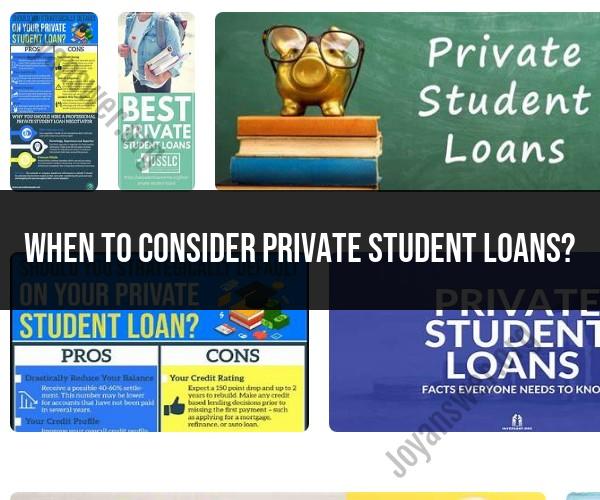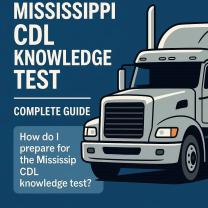When to consider private student loans?
Private student loans can be a valuable resource for financing your education, but they should generally be considered after you have exhausted all other sources of funding, such as federal student loans, grants, scholarships, and work-study options. Here's a decision-making guide to help you determine when it might be appropriate to consider private student loans:
Exhaust Federal Aid: Federal student loans typically offer more favorable terms, including lower interest rates and more flexible repayment options compared to private loans. Make sure you have applied for all federal aid by completing the Free Application for Federal Student Aid (FAFSA) and accepted any federal grants or loans you qualify for before exploring private loans.
Explore Scholarships and Grants: Scholarships and grants are financial aid that you don't need to repay, so look for as many of these opportunities as possible. Investigate scholarships offered by your school, private organizations, and professional associations related to your field of study.
Consider Work-Study: Federal work-study programs provide part-time employment opportunities for eligible students to earn money to help cover education expenses. It's worth exploring work-study options before turning to loans.
Evaluate Personal Savings and Family Contributions: Before taking on debt, assess your personal savings and any contributions from family members. Reducing your need for loans can significantly reduce the financial burden after graduation.
Compare Loan Terms: If you've exhausted all other options and still need additional funds for your education, carefully compare private student loan terms from different lenders. Consider factors like interest rates, repayment terms, fees, and borrower benefits.
Check Your Credit: Private lenders typically consider your credit history when approving loans. If you have a good credit score or a co-signer with good credit, you may qualify for better interest rates and terms. If your credit is less than ideal, you may need a co-signer to secure a private loan.
Borrow Responsibly: Only borrow what you need to cover essential education expenses, and avoid taking out more than you can reasonably expect to repay after graduation. Keep in mind that private loans often have higher interest rates and less favorable repayment terms than federal loans.
Shop Around: Don't settle for the first private lender you come across. Compare offers from multiple lenders to find the best loan terms for your specific situation. Online loan comparison tools can help streamline this process.
Understand Repayment Options: Private loans typically have fewer repayment options and may not offer income-driven repayment plans like federal loans. Be sure to understand the repayment terms and choose a lender that offers flexibility in case of financial hardship.
Plan for the Future: Consider the long-term impact of private student loans on your financial future. How will the loan payments fit into your post-graduation budget? Ensure that you have a plan for managing your student loan debt after you finish your education.
Remember that private student loans should be a last resort due to their generally less favorable terms and repayment options compared to federal loans. Always borrow responsibly and carefully review the terms and conditions of any loan before signing an agreement. If you have any doubts or questions, it's advisable to consult with a financial aid advisor or a trusted financial professional.
Weighing Your Options: When to Consider Private Student Loans for Education
Private student loans can be a good option for financing education, but it is important to weigh your options carefully before taking out a private loan. Here are a few things to consider:
- Cost: Private student loans typically have higher interest rates and fees than federal student loans.
- Repayment terms: Private student loans may have less flexible repayment terms than federal student loans.
- Creditworthiness: Private student loans typically require good credit or a cosigner.
- Eligibility: Private student loans may have stricter eligibility requirements than federal student loans.
Private Student Loans: Making Informed Choices for Financing Education
If you are considering taking out a private student loan, be sure to do your research and compare different lenders. Consider the following factors:
- Interest rate: Choose a loan with a competitive interest rate.
- Fees: Ask about any upfront fees or ongoing fees, such as late fees and prepayment penalties.
- Repayment terms: Choose a loan with repayment terms that you can afford.
- Cosigner requirements: If you do not have good credit, you may need a cosigner to qualify for a private student loan.
Private vs. Federal Loans: Deciding on the Right Student Loan Strategy
Generally speaking, federal student loans are a better option than private student loans because they have lower interest rates and more flexible repayment terms. However, private student loans may be a good option if you have already maxed out your federal student loan eligibility or if you need to borrow more money than you can qualify for in federal student loans.
Here are a few tips for choosing the right student loan strategy:
- Apply for federal student loans first. Federal student loans have lower interest rates and more flexible repayment terms than private student loans.
- Borrow only what you need. It is important to only borrow what you need to cover your educational expenses.
- Compare different lenders before taking out a private student loan. Be sure to compare interest rates, fees, and repayment terms before choosing a lender.
- Make your payments on time and in full. This will help you to avoid late fees and interest penalties.
If you are struggling to repay your student loans, there are a number of resources available to help you. You can talk to your lender about options for modifying your loan or you can apply for a student loan forgiveness program.












